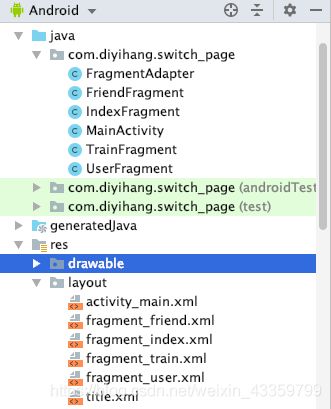安卓android-Viewpager+Frgment的结合使用
安卓android-Viewpager+Frgment的结合使用
- 首先我们来看个效果图
- 接下来看一下代码目录
- 在接下来我们就看看详细代码。
- title.xml
- activity_main.xml
- fragment_index.xml
- FragmentAdapter.java
- IndexFragment.java
- 最后,来到了我们最重要的MainActivity.java
- 按着上述步骤去做,就能得到一个精美的类似于微信的主页切换界面啦。
首先我们来看个效果图

当点击到下面的Tab按钮时,会像微信类似出现图标颜色的变化,且切换到该页面;
接下来看一下代码目录
在接下来我们就看看详细代码。
首先呢,我将activity_main分成了几个部分来写,tab部分我单独用title.xml文件来写,也方便我们以后该tab,然后在activity_main中include title.xml即可
title.xml
<LinearLayout xmlns:android="http://schemas.android.com/apk/res/android"
android:orientation="vertical" android:layout_width="match_parent"
android:layout_height="wrap_content"
android:background="#F2F1ED"
android:layout_alignParentBottom="true">
<TableRow
android:layout_height="40dp"
android:layout_width="match_parent"
android:layout_alignParentLeft="true"
>
<ImageView
android:id="@+id/tv_tab1"
android:layout_width="38dp"
android:layout_height="38dp"
android:src="@drawable/icon_find_colorless"
android:gravity="center"
android:layout_weight="1"
android:layout_marginLeft="10dp"
/>
<ImageView
android:id="@+id/tv_tab2"
android:layout_width="38dp"
android:layout_height="38dp"
android:src="@drawable/icon_book_colorless"
android:gravity="center"
android:layout_weight="1"
/>
<ImageView
android:id="@+id/tv_tab3"
android:layout_width="38dp"
android:layout_height="38dp"
android:src="@drawable/icon_home_colorless"
android:gravity="center"
android:layout_weight="1"
/>
<ImageView
android:id="@+id/tv_tab4"
android:layout_width="38dp"
android:layout_height="38dp"
android:src="@drawable/icon_people_colorless"
android:gravity="center"
android:layout_weight="1"
android:layout_marginRight="10dp"
/>
</TableRow>
<TableRow
android:layout_height="20dp"
android:layout_width="match_parent"
android:layout_alignParentLeft="true"
>
<TextView
android:id="@+id/tab_find"
android:layout_width="wrap_content"
android:layout_height="match_parent"
android:layout_marginLeft="10dp"
android:layout_weight="1"
android:gravity="center"
android:text="发现"
android:textColor="#B6B6B6"
android:textSize="15sp"
android:textStyle="normal" />
<TextView
android:id="@+id/tab_train"
android:layout_width="wrap_content"
android:layout_height="match_parent"
android:layout_weight="1"
android:gravity="center"
android:textStyle="normal"
android:text="训练"
android:textSize="15sp"
android:textColor="#B6B6B6"/>
<TextView
android:id="@+id/tab_friend"
android:layout_width="wrap_content"
android:layout_height="match_parent"
android:layout_weight="1"
android:gravity="center"
android:textStyle="normal"
android:text="团圈"
android:textSize="15sp"
android:textColor="#B6B6B6"/>
<TextView
android:id="@+id/tab_my"
android:layout_width="wrap_content"
android:layout_height="match_parent"
android:gravity="center"
android:layout_weight="1"
android:text="我的"
android:textSize="15sp"
android:textStyle="normal"
android:textColor="#B6B6B6"
android:layout_marginRight="10dp"/>
</TableRow>
</LinearLayout>
activity_main.xml
<androidx.drawerlayout.widget.DrawerLayout xmlns:android="http://schemas.android.com/apk/res/android"
xmlns:app="http://schemas.android.com/apk/res-auto"
xmlns:tools="http://schemas.android.com/tools"
android:layout_width="match_parent"
android:layout_height="match_parent"
tools:context=".MainActivity"
android:orientation="vertical"
android:id="@+id/drawerlayout_main">
<LinearLayout
android:layout_width="match_parent"
android:layout_height="match_parent"
android:orientation="vertical">
<androidx.viewpager.widget.ViewPager
android:layout_width="match_parent"
android:layout_height="match_parent"
android:layout_weight="1"
android:id="@+id/main_viewpager"
/>
// 底端Tab
<include layout="@layout/title" />
</LinearLayout>
<TextView
android:layout_width="match_parent"
android:layout_height="match_parent"
android:text="hello!"
android:textStyle="bold"
android:textSize="60sp"
android:gravity="center"
android:layout_gravity="left"
android:background="#ffffff"/>
</androidx.drawerlayout.widget.DrawerLayout>
fragment_index.xml
这里呢,我就举fragment的例子,其他的都是一样的。
<?xml version="1.0" encoding="utf-8"?>
<FrameLayout xmlns:android="http://schemas.android.com/apk/res/android"
android:orientation="vertical" android:layout_width="match_parent"
android:layout_height="match_parent">
<TextView
android:text="这是主页界面"
android:layout_width="match_parent"
android:layout_height="match_parent"
android:gravity="center"
android:textSize="60sp"
/>
</FrameLayout>
好了,现在布局都写好了,开始我们的代码的编写。
FragmentAdapter.java
首先呢,我先写一个要用到的适配器
package com.diyihang.switch_page;
import androidx.annotation.NonNull;
import androidx.fragment.app.Fragment;
import androidx.fragment.app.FragmentManager;
import androidx.fragment.app.FragmentPagerAdapter;
import java.util.List;
public class FragmentAdapter extends FragmentPagerAdapter {
private FragmentManager fragmentManager;
private List<Fragment> fragmentList;
public FragmentAdapter(FragmentManager fm, List<Fragment> list){
super(fm);
fragmentList=list;
}
@NonNull
@Override
public Fragment getItem(int position) {
return fragmentList.get(position);//显示第几个页面
}
@Override
public int getCount() {
return fragmentList.size();//共有几个页面
}
}
其实就是实现改方法的几个功能。
IndexFragment.java
package com.diyihang.switch_page;
import android.os.Bundle;
import android.view.LayoutInflater;
import android.view.View;
import android.view.ViewGroup;
import androidx.annotation.NonNull;
import androidx.annotation.Nullable;
import androidx.fragment.app.Fragment;
public class IndexFragment extends Fragment {
@Nullable
@Override
public View onCreateView(@NonNull LayoutInflater inflater, @Nullable ViewGroup container, @Nullable Bundle savedInstanceState) {
View view = inflater.inflate(R.layout.fragment_index,null);
return view;
}
}
和上面的fragment_index.xml一样,我就一个例子,其他都一样。
package com.diyihang.switch_page;
import android.os.Bundle;
import android.view.LayoutInflater;
import android.view.View;
import android.view.ViewGroup;
import androidx.annotation.NonNull;
import androidx.annotation.Nullable;
import androidx.fragment.app.Fragment;
public class IndexFragment extends Fragment {
@Nullable
@Override
public View onCreateView(@NonNull LayoutInflater inflater, @Nullable ViewGroup container, @Nullable Bundle savedInstanceState) {
View view = inflater.inflate(R.layout.fragment_index,null);
return view;
}
}
最后,来到了我们最重要的MainActivity.java
package com.diyihang.switch_page;
import androidx.appcompat.app.AppCompatActivity;
import android.graphics.Color;
import android.view.View;
import android.widget.ImageView;
import android.widget.TextView;
import androidx.viewpager.widget.ViewPager;
import androidx.fragment.app.Fragment;
import android.os.Bundle;
import java.util.List;
import java.util.ArrayList;
public class MainActivity extends AppCompatActivity implements View.OnClickListener{
private ImageView tvTab1;
private ImageView tvTab2;
private ImageView tvTab3;
private ImageView tvTab4;
private TextView tabFind;
private TextView tabTrain;
private TextView tabFriend;
private TextView tabMy;
Fragment fragment1 = new IndexFragment();
Fragment fragment2 = new TrainFragment();
Fragment fragment3 = new FriendFragment();
Fragment fragment4 = new UserFragment();
Integer[] selectedIcon = {
R.drawable.icon_find,
R.drawable.icon_book,
R.drawable.icon_home,
R.drawable.icon_people,
};
Integer[] unSelectedIcon = {
R.drawable.icon_find_colorless,
R.drawable.icon_book_colorless,
R.drawable.icon_home_colorless,
R.drawable.icon_people_colorless,
};
Integer[] fontColor ={
Color.parseColor("#B6B6B6"),
Color.parseColor("#03A9F4")
};
private ViewPager viewPager;
private List<Fragment> list;
private FragmentAdapter fragmentAdapter;
@Override
protected void onCreate(Bundle savedInstanceState) {
super.onCreate(savedInstanceState);
setContentView(R.layout.activity_main);
tabFind = findViewById(R.id.tab_find);
tabTrain = findViewById(R.id.tab_train);
tabFriend = findViewById(R.id.tab_friend);
tabMy = findViewById(R.id.tab_my);
tvTab1 = (ImageView) findViewById(R.id.tv_tab1);
tvTab2 = (ImageView) findViewById(R.id.tv_tab2);
tvTab3 = (ImageView) findViewById(R.id.tv_tab3);
tvTab4 = (ImageView) findViewById(R.id.tv_tab4);
viewPager=findViewById(R.id.main_viewpager);
//设置监听事件
tabFind.setOnClickListener(this);
tabTrain.setOnClickListener(this);
tabFriend.setOnClickListener(this);
tabMy.setOnClickListener(this);
tvTab1.setOnClickListener(this);
tvTab2.setOnClickListener(this);
tvTab3.setOnClickListener(this);
tvTab4.setOnClickListener(this);
viewPager.setOnPageChangeListener(new MyPagerChangeListener());//设置页面切换的监听
list = new ArrayList<>();//添加Fragment
list.add(fragment1);
list.add(fragment2);
list.add(fragment3);
list.add(fragment4);
//添加适配器
fragmentAdapter = new FragmentAdapter(getSupportFragmentManager(),list);//创建适配器
viewPager.setAdapter(fragmentAdapter);
//初始化第一个页面
viewPager.setCurrentItem(0);
//设置选中图片
tvTab1.setImageResource(selectedIcon[0]);
tvTab2.setImageResource(unSelectedIcon[1]);
tvTab3.setImageResource(unSelectedIcon[2]);
tvTab4.setImageResource(unSelectedIcon[3]);
//设置字体颜色
tabFind.setTextColor(fontColor[1]);
tabTrain.setTextColor(fontColor[0]);
tabFriend.setTextColor(fontColor[0]);
tabMy.setTextColor(fontColor[0]);
}
@Override
public void onClick(View view) {//标题栏的点击事件
switch (view.getId()) {
case R.id.tv_tab1:
viewPager.setCurrentItem(0);
//设置选中的图片
tvTab1.setImageResource(selectedIcon[0]);
tvTab2.setImageResource(unSelectedIcon[1]);
tvTab3.setImageResource(unSelectedIcon[2]);
tvTab4.setImageResource(unSelectedIcon[3]);
//设置字体颜色
tabFind.setTextColor(fontColor[1]);
tabTrain.setTextColor(fontColor[0]);
tabFriend.setTextColor(fontColor[0]);
tabMy.setTextColor(fontColor[0]);
break;
case R.id.tv_tab2:
viewPager.setCurrentItem(1);
//设置底部tab栏的背景色
tvTab1.setImageResource(unSelectedIcon[0]);
tvTab2.setImageResource(selectedIcon[1]);
tvTab3.setImageResource(unSelectedIcon[2]);
tvTab4.setImageResource(unSelectedIcon[3]);
//设置字体颜色
tabFind.setTextColor(fontColor[0]);
tabTrain.setTextColor(fontColor[1]);
tabFriend.setTextColor(fontColor[0]);
tabMy.setTextColor(fontColor[0]);
break;
case R.id.tv_tab3:
viewPager.setCurrentItem(2);
//设置底部tab栏的背景色
tvTab1.setImageResource(unSelectedIcon[0]);
tvTab2.setImageResource(unSelectedIcon[1]);
tvTab3.setImageResource(selectedIcon[2]);
tvTab4.setImageResource(unSelectedIcon[3]);
//设置字体颜色
tabFind.setTextColor(fontColor[0]);
tabTrain.setTextColor(fontColor[0]);
tabFriend.setTextColor(fontColor[1]);
tabMy.setTextColor(fontColor[0]);
break;
case R.id.tv_tab4:
viewPager.setCurrentItem(3);
//设置底部tab栏的背景色
tvTab1.setImageResource(unSelectedIcon[0]);
tvTab2.setImageResource(unSelectedIcon[1]);
tvTab3.setImageResource(unSelectedIcon[2]);
tvTab4.setImageResource(selectedIcon[3]);
//设置字体颜色
tabFind.setTextColor(fontColor[0]);
tabTrain.setTextColor(fontColor[0]);
tabFriend.setTextColor(fontColor[0]);
tabMy.setTextColor(fontColor[1]);
break;
}
}
class MyPagerChangeListener implements ViewPager.OnPageChangeListener {
@Override
public void onPageScrolled(int position, float positionOffset, int positionOffsetPixels) {
}
@Override
public void onPageSelected(int position) {
switch (position) {//滑动监听
case 0:
tvTab1.setImageResource(selectedIcon[0]);
tvTab2.setImageResource(unSelectedIcon[1]);
tvTab3.setImageResource(unSelectedIcon[2]);
tvTab4.setImageResource(unSelectedIcon[3]);
break;
case 1:
tvTab1.setImageResource(unSelectedIcon[0]);
tvTab2.setImageResource(selectedIcon[1]);
tvTab3.setImageResource(unSelectedIcon[2]);
tvTab4.setImageResource(unSelectedIcon[3]);
break;
case 2:
tvTab1.setImageResource(unSelectedIcon[0]);
tvTab2.setImageResource(unSelectedIcon[1]);
tvTab3.setImageResource(selectedIcon[2]);
tvTab4.setImageResource(unSelectedIcon[3]);
break;
case 3:
tvTab1.setImageResource(unSelectedIcon[0]);
tvTab2.setImageResource(unSelectedIcon[1]);
tvTab3.setImageResource(unSelectedIcon[2]);
tvTab4.setImageResource(selectedIcon[3]);
break;
}
}
@Override
public void onPageScrollStateChanged(int state) {
}
}
}

